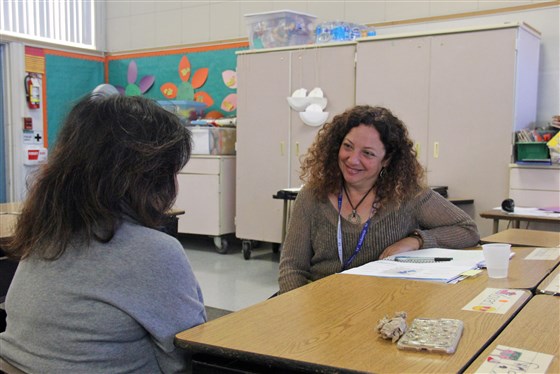Why we should equip early childhood teachers to work with challenging childhood behaviors
 By Tena H. Sloan, LMFT, IFECMHS/RFP-II, vice president of early childhood mental health consultation and training at Kidango. Published on March 11, 2019.
By Tena H. Sloan, LMFT, IFECMHS/RFP-II, vice president of early childhood mental health consultation and training at Kidango. Published on March 11, 2019.
There is an advancing movement in California to integrate early childhood mental health consultation (ECMHC) services within early care and education programs (ECE). This movement has been led by Kidango. In 2018, we sponsored ECMHC legislation that was signed into law by then-Governor Brown. Thanks in-part to this bill, California is taking a national lead on this issue, which was highlighted in a recent article on NBC News.
What is Early Childhood Mental Health Consultation?
ECMHC is a service aimed to prevent, identify, treat, and reduce the impact of mental health problems and challenging behaviors in young children. How is this accomplished? Good question.
ECMHC, in its essence, is a process where a professional consultant – with specialized experience and training in early childhood mental health – meets with adult caregivers to support them in their important and complex task of caring for young children. The consultant partners with teachers, other staff and families through meetings, conversations, trainings and other consultative activities to build their capacity (knowledge, skills and resources) to:
- support every child to thrive and achieve their own unique developmental and learning potential
- promote the social-emotional health and development of all children in the classroom or home
- work effectively and collaboratively with children and families with mental health concerns, challenging behaviors and individual developmental differences
- support the utilization of best practices and strategies
- enhance all relationships involved in the care setting
- build strong school/home alliances between staff and families
The Need for ECMHC
Early educators have one of the most important responsibilities: caring for very young children who are developing rapidly, and preparing them for kindergarten and life. ECE staff share wonderful stories of triumph and success with children and families. But they also share many stories about the challenging situations faced every day, especially trying to teach and respond to challenging behaviors.
The challenging behaviors children demonstrate seem to increase with the complexity of the difficulties that they, their families and communities confront, such as poverty, substance abuse, depression, domestic violence, family separation and incarceration (just to name a few). Research by Dr. Walter Gilliam of Yale University brought to light how child care programs expel children at three times the rate of K-12 students, in a cycle of disruptive transitions that interfere with these children’s critical need for stability.
Assembly Bill 752, authored by Assemblymember Blanca Rubio and sponsored by Kidango, was passed in 2017 and generally prohibits preschool expulsion because of a child’s behavior and instead creates a process for addressing persistent and serious challenging behaviors. Assembly Bill 2698, again authored by Rubio and sponsored by Kidango, offers teachers help in dealing with these difficult behaviors by enabling state-funded preschool programs to allocate unspent existing contract funds for ECMHC services.
Teachers want and need more support to help them give their best and fulfill what likely brought them into the teaching profession: to make a difference in the lives of young children. ECMHC provides that critical help.
ECMHC Benefits
Research shows consultation works. Studies have found that after experiencing consultation services:
- staff confidence and competence increased for dealing with troubling or difficult behaviors of young children in their care
- the overall quality of early care and education setting improved
- staff turnover was impacted and reduced
- the classroom climate improved resulting in more positive interactions between teachers and children, and fewer negative exchanges
- staff rated themselves as significantly more able to manage children’s difficult behavior
- teachers generally reported lower levels of job stress
- teachers reported children displayed fewer problem behaviors after these services were implemented
- the rate of expulsion of children with difficult or challenging behavior decreases — anecdotal reports suggest a more than 50% decrease
The process of preparing for and engaging in consultation is an investment of time, energy and resources for the ECE organization. But given dealing with challenging situations and challenging behaviors is one of the most pressing and urgent struggles for ECE staff, the investment in ECMHC sure looks worthwhile.
What role do you think ECE providers should have in working with challenging child behaviors? Leave a comment below or tweet us @kidango.










That’s cool that mental health training and understanding can help early childhood educators better manage children’s difficult behavior. My friend has been thinking about going into childhood education. She’ll have to find a good training program that helps her understand how to deal with all kinds of behavior. https://www.owfc.com.au/About.asp?_=Training